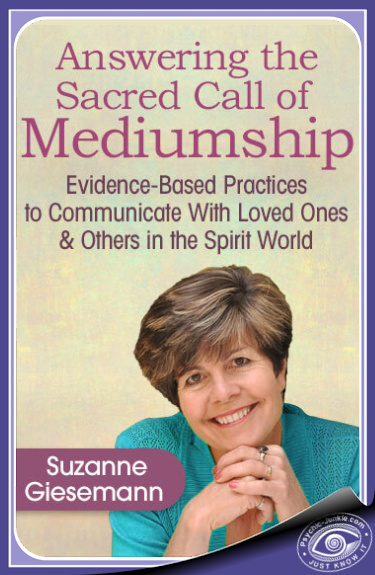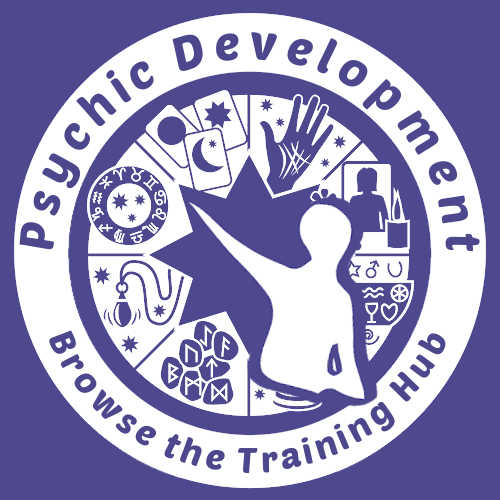- Home
- Psychic Life Coaching
- Personal Growth and Development Plan
The Personal Growth And Development Plan For Self Actualization
My personal growth and development plan for self-actualization is simple to follow and magnanimous in its results. I created “The Way of Personal Development” by bringing together the far-reaching psychology of Abraham H Maslow (1908 - 1970) and the timeless spirituality of Lao-Tzu’s (600 BC) ‘Tao Te Ching’.
Abraham Maslow pointed out that “only a few of us reach Self Actualization (being your true self – fully human). This is because so many people get stuck in striving for their lower needs and never get to realize their exalted realms of purpose and meaning”. I feel as if the game of life is rather like playing a subconscious game of Snakes and Ladders (Chutes and Ladders for my American friends) within Maslow’s hierarchy of needs. It is apparent to me that many people climb and fall in the three lower levels of Maslow’s hierarchy, spending much of their time cycling between basic physiological survival, foundational safety in health, work, finances and family matters, and striving for love and belongingness.
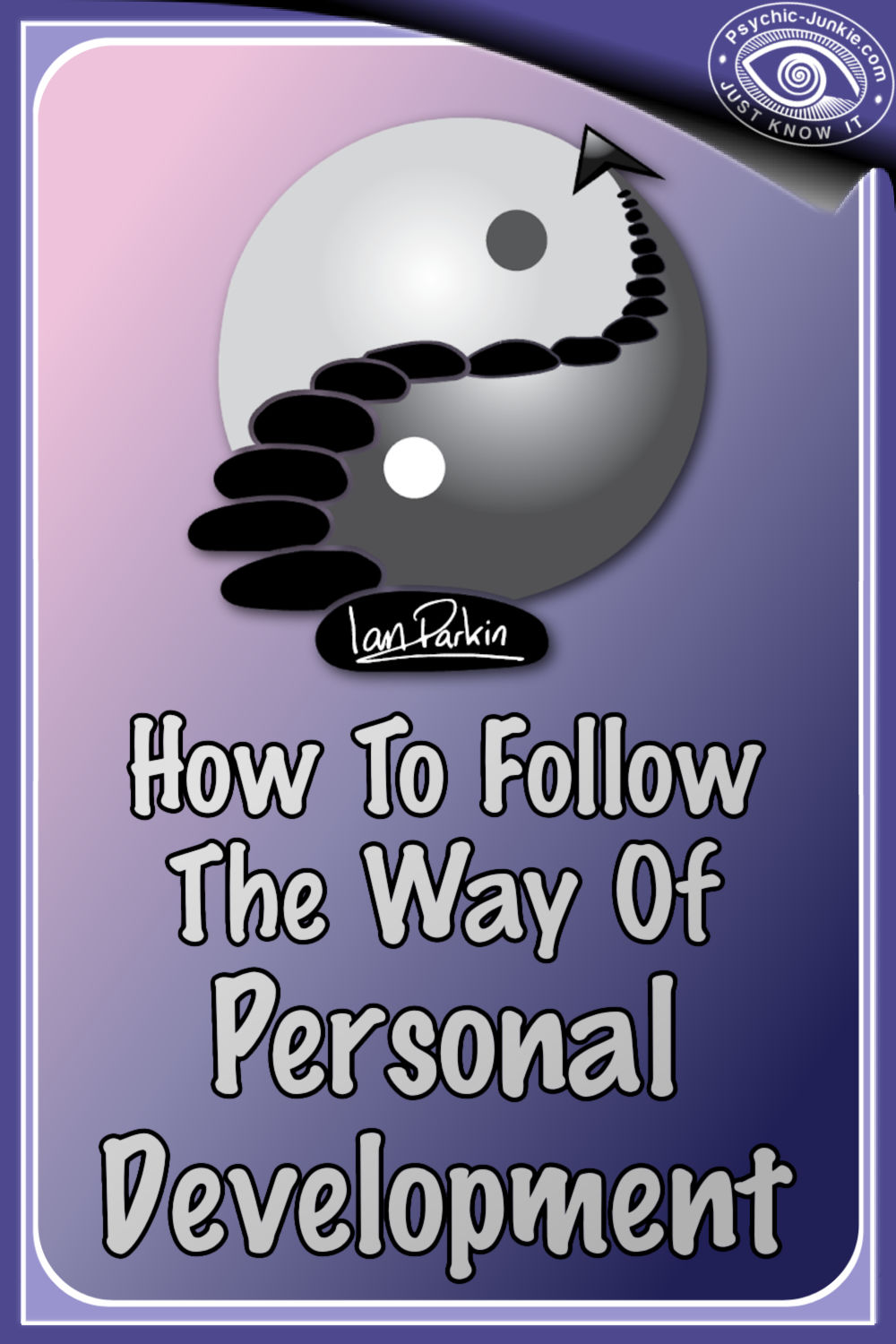 The Personal Growth And Development Plan For Self Actualization
The Personal Growth And Development Plan For Self Actualization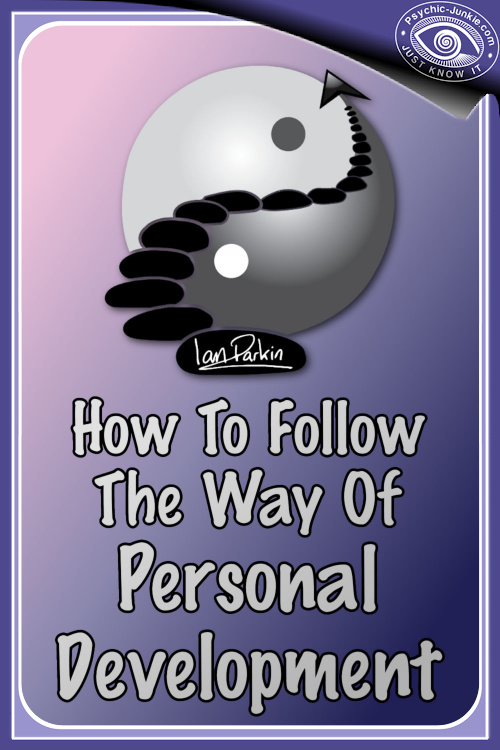 The Personal Growth And Development Plan For Self Actualization
The Personal Growth And Development Plan For Self ActualizationMaslow was right in identifying that not enough of us rise high enough to feel self-confidence, worth, and strength. Or find the capability and adequacy of being useful and necessary in the world. Very few aspire to find the ultimate happiness of self-actualization. Even less go beyond our ordinary human level of consciousness and experience oneness with the greater whole, the higher truth in self-transcendence, whatever that may be to each of us individually.
"The thing to do seems to be to find out what you are really like inside, deep down, as a member of the human species and as a particular individual". - A. Maslow
So here is a personal growth and development plan to help you play the game of life in a new way . . .
My personal development plan to climb the ladders in the hierarchy of needs without endlessly chuting down the snakes!
By self-assessing against the Maslow Hierarchy of Needs and adopting Maslow’s Self-Actualizing characteristics I have devised my personal growth plan to guide you across the stepping stones of destiny, towards realizing a life of purpose and meaning too. The Maslow hierarchy of needs gives you a way to map your life path.
What is the Maslow hierarchy of needs?
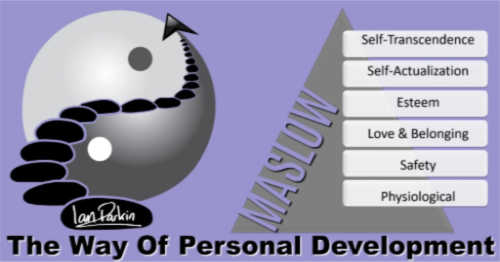
In my layman’s view, Abraham Maslow revealed a deeply unconscious goal of Self Actualization that can be brought to the surface and then used to guide and motivate us throughout the passage of our lives. This map has formed an integral part of my personal growth and development plan. I believe it is fundamentally important for us to know where we are on this ‘needs pyramid’. To progress our lives more easily toward the goal of self-actualization and then on to the ultimate aspiration of self transcendence.
The Maslow Hierarchy of Needs
1) At the base of the Maslow Hierarchy of Needs are the Physiological Needs.
In the Physiological Needs we must be able to breath freely, have access to food and water, have shelter from the elements, have clothing, have sex, and be able to sleep. Homeostasis takes hold here which means we want everything to remain stable and be relatively constant.
- Physiological Checklist: Breathing, food, water, shelter, clothing, sleep, sex, homeostasis.
2) Once our physiological needs are met, we move on up to satisfying the Safety Needs.
At this level we seek to maintain a safe, predictable orderly and organized life that we can rely on. We are in avoidance of anything unexpected, anything more than we can easily manage, and certainly nothing dangerous. Here we find the basic physical safety needs for our body, employment, health, and home.
- Safety Checklist: Health, gainful employment, home, family, social stability.
3) So, we are feeling safe, now we unconsciously strive to meet the Love and Belonging Needs.
At this level, a desire for a sense of connection becomes stronger. We seek affection and appreciation within our family and friends. We will now look for a place in our tribe/group/gang. Love and intimacy is now important in sex (where it was not at the basic physiological level).
- Love and Belonging Checklist: Love, affection, appreciation, belonging, intimacy.
4) Feeling love and appreciation within friends and family we are now able to progress to the next level. The Esteem Needs.
Now we not only have a need for self-respect and self-esteem, but we also desire the stable and firm respect of others in the bigger world. This is the first real stage where independence and freedom are becoming important. We need to have our achievements acknowledged by ourselves and by others, so that we feel strong and valued in the world. Thwarting our feelings of esteem, worth, confidence, adequacy, and usefulness at this level can produce states of depression and feelings of helplessness.
- Esteem Checklist: Self-esteem, confidence, achievement, respect, usefulness, valued by others.
5) When feel of value in the world, by ourselves and by others, we may begin the transition to Self-Actualization.
This is the level of being fully human, being your true self. “Even if all [the lower] needs are satisfied, we may still often (if not always) expect that a new discontent and restlessness will soon develop, unless the individual is doing what [one] is fitted for. A musician must make music, an artist must paint, a poet must write, if [one] is to be ultimately happy. What [one] can be, [one] must be. This need we may call self-actualization”. – Maslow, Abraham H. A Theory of Human Motivation [my edits]
- Self-Actualization Checklist: Morality, creativity, spontaneity, acceptance, experience of purpose, meaning and inner potential.
6) Unfortunately, most people get stuck striving in the lower needs and never get to realize a life of true purpose and meaning. In writing this personal improvement plan I hope to help you over that line and, all being well, to go even further to experience oneness with the greater whole and to ultimately realize your higher truth in Self-Transcendence.
Here lays the desire to go beyond our ordinary human level of consciousness and experience oneness with the greater whole, the higher truth, whatever that may before you. This can lead to peak experiences of mystical, spiritual, and ecstatic moments with illuminations or insights or cognitions which change our view of the world and of ourselves.
- Self-Transcendence Checklist: Altruism, selflessness, creativity, humility, applied intelligence, lack of prejudice and divergent thinking.
If you are researching the Maslow Hierarchy of Needs you will most likely only find the first five levels talked about. That was his earlier model circa 1943 but the more accurate model, considering his later work, shows all six levels of the hierarchy. In 1969 Maslow planned to produce a new book encompassing all his newer works. By 1970 he had selected his articles from which to author the new book but in June of that year suffered a fatal heart attack. Those articles now comprise the chapters of a book first published in 1971 titled The Farther Reaches of Human Nature by A.H. Maslow.
Utopia Changes at each level.
“Another peculiar characteristic of the human organism when it is dominated by a certain need is that the whole philosophy of the future tends also to change. For our chronically and extremely hungry man, Utopia can be defined very simply as a place where there is plenty of food. He tends to think that, if only he is guaranteed food for the rest of his life, he will be perfectly happy and will never want anything more. Life itself tends to be defined in terms of eating. Anything else will be defined as unimportant. Freedom, love, community feeling, respect, philosophy, may all be waved aside as fripperies which are useless since they fail to fill the stomach.” – Maslow, Abraham H. A Theory of Human Motivation . Kindle Edition.
Because, deep down in our subconscious, our behaviours are directed by unsatisfied needs, only once fulfilled do we subconsciously begin to strive higher in the Hierarchy of Needs. So, let's say that you attend a motivating self help seminar and you come away with some awesome personal development goals, if those goals are aligned to your esteem needs (level four) but you are still striving to satisfy your basic safety needs (level two) you will never know why you just can’t get yourself to stretch out of your comfort zone and go-get-em!
As a psychic life coach I have noticed this play out too often - unless we are either ‘genuinely at’ a high level in the Hierarchy of Needs OR we are able to ‘Trick The Brain’ (I recommend NLP) at our subconscious level, to feel as if our basic needs levels are already met, we simply do not find our way to those lofty goals.
"The “better” culture gratifies all basic human needs and permits self-actualization. The “poorer” cultures do not. The same is true for education. To the extent that it fosters growth toward self-actualization, it is “good” education" – Toward a Psychology of Being by Abraham H. Maslow
What are the characteristics of self actualizing people according to Maslow?
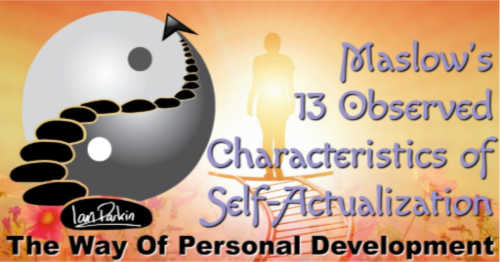
Based on his case studies of historical figures whom he believed to be self-actualized, Maslow found that self-actualizers shared similarities that he listed as the 13 characteristics of self-actualization.
Superior Perception of Reality + Increased Acceptance of Self, of Others and of Nature + Increased Spontaneity + Increase in Problem-Centering + Increased detachment and desire for privacy + Increased Autonomy, and Resistance to Enculturation + Greater Freshness of Appreciation, and Richness of Emotional Reaction + Higher Frequency of Peak Experiences + Increased Identification with The Human Species + Profound Interpersonal Relationships + More Democratic Character Structure + Greatly Increased Creativeness + Certain of Changes in The Value System
Try this for yourself. Self-assess against this list, making a note of those characteristics of self-actualization you honestly feel you lack. Then you can simply use those notes as a blueprint for the qualities to work on in your own version of my personal growth and development plan.
The 13 Characteristics of Self Actualization Check-List in Full
1. Superior Perception of Reality.
Self-actualizers (SAs) can judge situations correctly and honestly. They are very sensitive to the fake and dishonest and are free to see reality ‘as it is’.
- [1 to 10] rate yourself on having a Superior Perception of Reality [____]
2. Increased Acceptance of Self, of Others, and of Nature.
Self-actualizers accept their own human nature with all its flaws. The shortcomings of others and the contradictions of the human condition are accepted and tolerated. And while they can laugh good-heartedly at themselves, they will never direct sarcasm to others in jest.
- [1 to 10] rate yourself in your Acceptance of Self [____], Others [____], Nature [____]
3. Increased Spontaneity.
In SAs spontaneity is simple and natural. They enjoy the freedom to be true to themselves, acting impulsively when they want to rather than holding back and acting how others may want them to be.
- [1 to 10] rate yourself on being Spontaneous and Natural [____]
4. Increase in Problem-Centering.
Most of Maslow’s subjects were ‘focused beyond self’ as if they had a mission to fulfill in life or some task or problem ‘beyond’ themselves (instead of outside or inside themselves).
- [1 to 10] rate yourself on being Focused Beyond Self [____]
5. Increased Detachment and Desire for Privacy.
Despite their satisfying relationships with others, self-actualizing people are ‘comfortably detached’ and value solitude and being alone. Even in the company of genuinely close friends SAs can seem detached by a lack in their need for constant communication.
- [1 to 10] rate yourself on your level of Comfortable Detachment [____]
6. Increased Autonomy, and Resistance to Enculturation.
Self-actualizers have a high level of autonomy and are tend not to rely on external authorities or other people. They are resourceful, independent, and reliant on their own experiences and judgement. They are Independent thinkers and are not reliant on culture or environment to form their own opinions and views.
- [1 to 10] rate yourself on having the characteristic of Autonomy [____]
7. Greater Freshness of Appreciation, and Richness of Emotional Reaction.
With this ‘innocence of vision’ the self-actualizer holds a continued freshness of appreciation. A sunset or a flower is most often experienced as intensely as it was at first appreciated. With eyes of an artist or child SAs constantly renew their appreciation of life’s basic good things.
- [1 to 10] rate yourself on maintaining an Innocence of Vision [____]
8. Higher Frequency of Peak Experiences.
All of Maslow’s subjects reported the frequent occurrence of peak experiences. These occasions were marked by feelings of ecstasy, harmony, and deep meaning. Sometimes described as a mystic experience. Self-actualizers have times they describe as feeling filled with light, in tune with the universe, or at one with all others, making them feel stronger and calmer than ever before.
- [1 to 10] rate yourself on the frequency of your Peak Experiences [____]
9. Increased Identification with The Human Species.
Self-actualizers are socially compassionate and feel connected to all of humanity.
- [1 to 10] rate yourself on your feelings of Connectedness to Humanity [____]
10. Profound Interpersonal Relationships.
The interpersonal relationships of self-actualizers are marked by deep loving bonds. While usually possessing fewer friends, those friendships will be close and more intimate. SAs do not collect many surface relationships.
- [1 to 10] rate yourself on the depth of your Interpersonal Relationships [____]
11. More Democratic Character Structure.
While SAs value their own autonomy (tend not to rely on external authorities or other people) they do recognise, and hold equal the individual rights and strengths in all people.
- [1 to 10] rate yourself on your Democratic Characteristic [____]
12. Greatly Increased Creativeness.
SAs enjoy times of high creativity that may be expressed in many areas. Creativity is not limited to the arts and sciences. Maslow has said that a first-rate cook is better than a second-rate painter.
- [1 to 10] rate yourself on your Creativeness [____]
“To be creative means to be in love with life. You can be creative only if you love life enough that you want to enhance its beauty, you want to bring a little more music to it, a little more poetry to it, a little more dance to it.” - Osho
13. Certain of Changes in The Value System.
Self-actualizing people are aware that they are not perfect and that there are always going to be new things to learn and new ways to grow. They are certain there will be changes in their value system and thus changes in their outlook.
- [1 to 10] rate yourself on your Certainty of Change [____]
Some suggestions for bringing these 13 Characteristics of Self-Actualization into your personal growth and development plan are: hypnosis, NLP, Tapping, Psycho-Therapy, Counselling, and my own Psychic Life Coaching.
My personal growth and development plan in a nutshell.
1) Maslow’s Hierarchy of Needs describes the pattern that we are subconsciously motivated by as we move through life. From the base to top of the hierarchy they are:
- Self-Transcendence
- Self-Actualization
- Esteem Needs
- Love and Belonging Needs
- Safety Needs
- Physiological Needs
Once we realize what drives us, from the subconscious level, we can uncover the hidden blocks in our journey of realizing our true selves.
“The privilege of a lifetime is being who you are.” – Joseph Campbell
2) Maslow’s Characteristics of Self-Actualization. So let’s aim for the top and go for the good life conceived by Maslow as self-actualization. From studying the likes of Einstein, Lincoln, Jefferson, Roosevelt, and others he saw as exemplary (self-actualized) people, Maslow observed the following common traits among them all.
- Superior Perception of Reality
- Increased Acceptance of Self, of Others and of Nature
- Increased Spontaneity
- Increase in Problem-Centering
- Increased detachment and desire for privacy
- Increased Autonomy, and Resistance to Enculturation
- Greater Freshness of Appreciation, and Richness of Emotional Reaction
- Higher Frequency of Peak Experiences
- Increased Identification with The Human Species
- Profound Interpersonal Relationships
- More Democratic Character Structure
- Greatly Increased Creativeness
- Certain of Changes in The Value System
Incorporating these characteristics as part of your personal growth and development plan is a powerful. How you integrate them is up to you, but in my practice, I use Neuro Linguistic Programming (NLP) to trick the brain.
"Self-actualizing people enjoy life in general and in practically all its aspects, while most other people enjoy only stray moments of triumph, of achievement or of climax or peak experience.” – Toward a Psychology of Being by Abraham H. Maslow
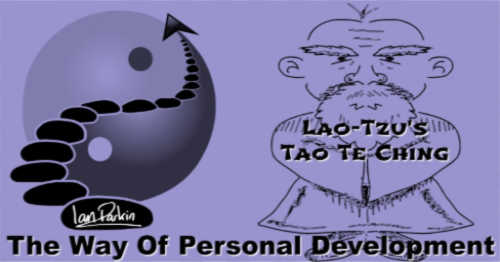
3) Lao Tzu’s Tao Te Ching. The ancient Chinese philosopher Lao-Tzu is the fabled author of the Tao Te Ching and is said to be the founder of Taoism. I find the text a source of inspiration and it is in complete alignment with what Maslow called, the Being Values or Metaneeds of his Self-Actualizing characteristics. This little book of wisdom is one of the most translated works in world literature. But I find in many of the translations (of other translations) the pure form of ancient wisdom has become rather ambiguous. I recommend the Richard Wilhelm Edition translated into English by H.G. Ostwald. ISBN:0140190600. (Out of print and can be hard to come by now.)
Alternatively, as a personal growth and development plan for the total beginner, there is nothing better than The Tao of Pooh. A sweet little book written by Benjamin Hoff. I found it to be a perfect introduction to the Eastern belief system of Taoism for Westerners. It literally employs the fictional characters of A. A. Milne’s Winnie-the-Pooh stories to explain the basic principles of the Tao.
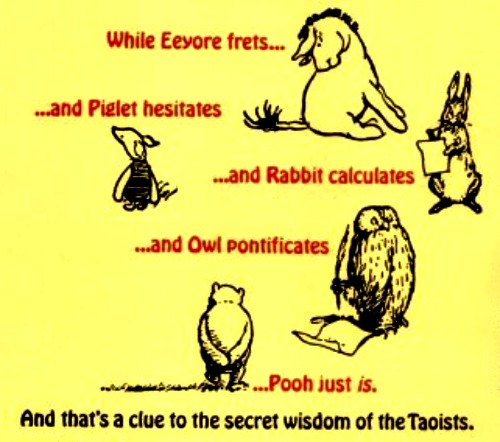
The Tao of Pooh
- “What’s that?” the Unbeliever asked.
- “Wisdom from the Western Taoist,” I said.
- “It sounds like something from Winnie-the-Pooh ,” he said.
- “It is,” I said.
- “That’s not about Taoism,” he said.
- “Oh, yes it is,” I said.”
– Benjamin Hoff
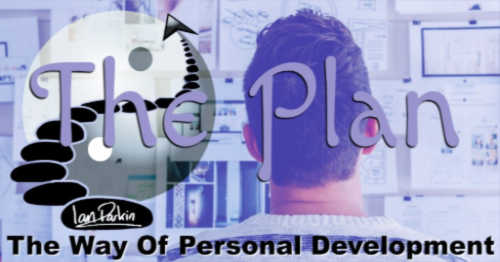
Making my personal growth and development plan your own.
First get to know the subconscious needs in Maslow’s hierarchy. As with planning any journey, you will want to know where you are now so you can plan to get to where you want to be (The Good Life).
Then familiarize yourself with all thirteen characteristics found in Self-Actualized people. Once acquainted with them all, you will want to embrace them fully into your personality. To do that book a session with an expert NLP consultant of your choice (or book a session with me) to get the characteristics embedded deep in you psyche.
To maintain your Actualized-Self ponder upon the Tao Te Ching often.
Recommended reading for your personal growth and development plan
Toward a Psychology of Being by Abraham H. Maslow
A Theory of Human Motivation by Abraham H. Maslow
Tao Te Ching: The Book of Meaning and Life by Lao Tzu , Richard Wilhelm, et al.
The Tao of Pooh by Benjamin Hoff
Products from Amazon, publishing affiliate may get a commission
Get more Personal Development from SelfGrowth.com
Learn To Be A Psychic Medium
An Evidence-Based Path to Communicate With Loved Ones & Others in the Spirit World.
In this FREE hour with Suzanne Giesemann, you will: Gain an understanding of “evidential” mediumship and why it’s so sacred. Discover the 3 keys to mediumship: Belief in the Spirit World, alignment, and a shift in focus from the physical to the Spirit World. Learn how you can begin communicating with your loved ones who have passed. Find mediumship can be a path for your soul’s evolution. Hear about what makes a reading “evidence-based” - and how this form of mediumship raises the bar and meets the true goal of being an authentic and indisputable voice for Spirit. Experience a practice to connect with your guides and ask them for signs. Click here to learn more about this free event > >
Test Your Psychic Ability
The Lifeleap Institute’s Psychic Project is a unique online psychic development tool using real people and events as "psychic targets."
They start by asking you to focus on the "psychic targets" and answer a series of special questions about these targets.
They then reveal to you the actual psychic targets. You get to compare your results with the actual psychic targets. You also get to see the results of other participants.
Even if you think you have no psychic ability, this tool will offer proof that you do.
It's easy to participate and the Psychic Project is free!
Click Here To Test Your Psychic Ability
Develop Your Intuition And Become An Online Tarot Card Reader
You can learn how to become a professional online tarot card reader in 90 days or less with Tatiana Jones' bestselling course.
In this short course, Titania teaches everything you need to know to start an online tarot reading business - with zero experience required!
You do not need to be psychic to read tarot cards online! It is all about being intuitive and “connecting the dots”.
Tarot Reading Entrepreneurship
- Help People Find Meaning
- Work Remotely
- Set Your Own Hours
- Replace Your Full Time Income
- Work Just A Few Hours Per Day
- Home
- Psychic Life Coaching
- Personal Growth and Development Plan
Ian Parkin is the author of this post.
